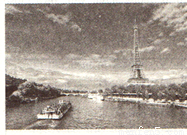题目内容
People have strange ideas about food. For example, the tomato is a kind of very delicious vegetable. It is one of the useful plants that can be prepared in many ways. It has rich nutrition(营养) and vitamin (维他命) in it. But in the 18th century, Americans never ate tomatoes. They grew them in their gardens because tomato plants are so pretty. But they thought the vegetable was poisonous(有毒的). They called tomatoes “poison apples”.
President(总统) Thomas Jefferson, however, knew that tomatoes were good to eat. He was a learned man. He had been to Paris, where he learned to love the taste of tomatoes. He grew many kinds of tomatoes in his garden. The President taught his cook a way for a cream of tomato soup. This beautiful pink soup was served at the President’s party. The guests thought the soup tasted really good. They never thought their president would serve his honored guests poison apples. Jefferson never spoke to his honored guests about the fact.
1.After you read the passage, which of the following do you think is true?
A. Americans never ate tomatoes in the 18th century while they began to plant them.
B. Americans didn’t eat tomatoes before 19th century.
C. Even now Americans don’t eat tomatoes.
D. In the 18th century Americans ate a lot of tomatoes.
2.The passage tells us that Jefferson was a President of ______?
A. a European country B. England C. France D. the United States
3.Jefferson learned that tomatoes were good to eat ___.
A. while he was in Paris B. when he was a little boy
C. because his parents told him so D. from books
4.From the passage we know all the honored guests invited by Jefferson were _____.
A. people from other countries B. from France
C. people of his own country D. men only
5.According to the passage, which of the following is NOT true?
A. All of the guests knew the soup that was served at the President’s party was made of tomatoes.
B. All of the guests thought the soup which was prepared by the President’s cook was nice.
C. All of the guests thought the taste of the beautiful pink soup was nice.
D. All the guests didn’t know that their president would serve his honored guests with “poison apples”.
1.A 2.D 3.A 4.C 5.A 【解析】试题本文介绍了美国人由不吃西红柿到发现其美味的过程。在18世纪的美国,当时人们都认为西红柿是可观赏的有毒食物,但是了解西红柿情况的总统用来招待了他的客人,结果客人都说西红柿是很好吃的。 1.题意:读完这篇文章,你认为下列哪一项是正确的?考查细节理解题。A. Americans never ate tomatoes ...

